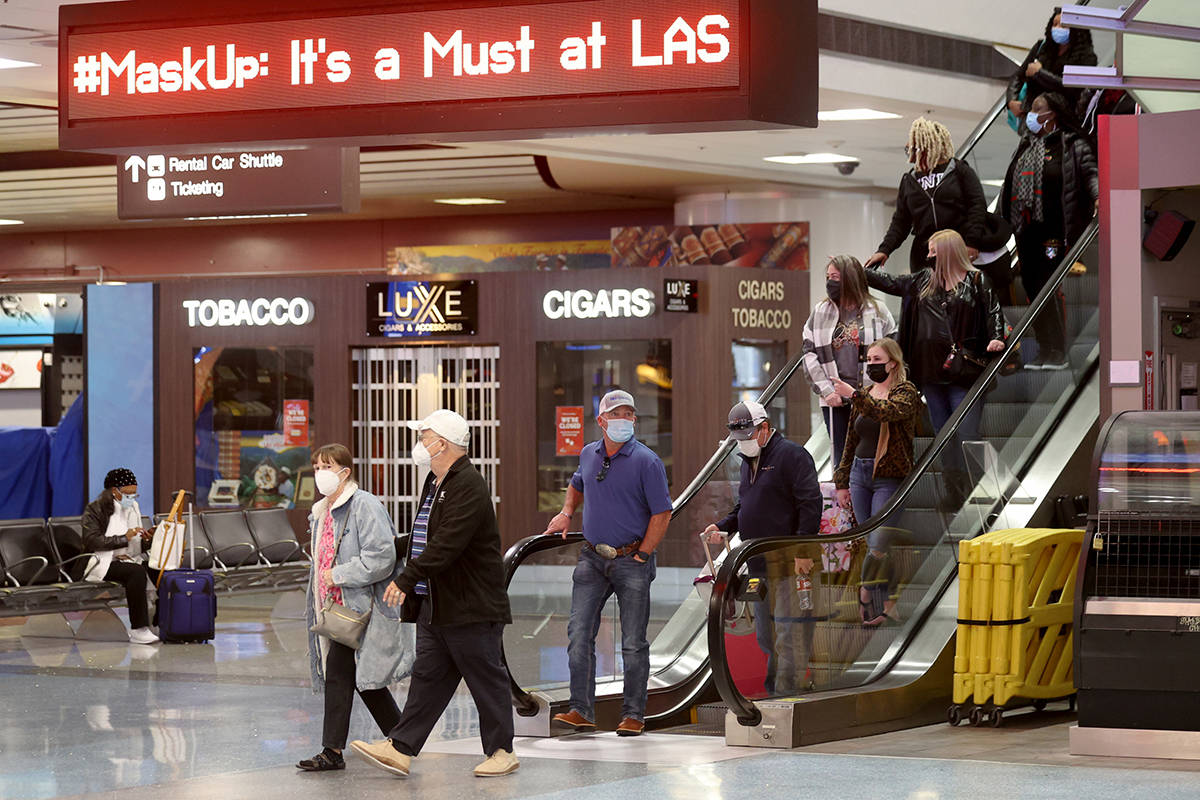Travel group uneasy about possible testing mandate for domestic flights
The U.S. Travel Association is ready to kick-start the recovery of the travel industry, which has so far suffered more than $500 billion in pandemic-related losses.
Heads of the nonprofit organization said Wednesday that they are working with the Biden administration on policies that can be implemented within the president’s first 100 days in office.
While these efforts could help economic revivals in tourism-dependent cities like Las Vegas, the USTA acknowledged roadblocks to recovery, including a potential new federal mandate that would require COVID-19 testing for domestic flights.
Local tourism experts say this additional step for travel could impair Las Vegas’ recovery efforts.
The pandemic “is our toughest challenge yet,” President and CEO Roger Dow said during USTA’s annual State of the Travel Industry address Wednesday. “Our elected officials must prioritize travel’s revival so we can get people moving again and restore jobs and supercharge America’s recovery.”
Domestic testing ‘problematic’
An official from the Centers for Disease Control and Prevention said Tuesday that Biden’s team is “actively looking” at requiring COVID-19 tests before domestic flights. The administration last week announced a mandate for testing before international flights.
USTA officials believe additional testing requirements for travelers within the U.S. would be “problematic.”
Tori Emerson Barnes, USTA’s executive vice president of public affairs and policy, said testing for domestic flights would be difficult to implement and enforce. The organization estimates that such a requirement would necessitate a 42 percent increase in the nation’s daily testing capacity.
“We are supportive of the requirement to test folks coming in internationally, (but) we think the domestic approach would be very dangerous,” she said. “The high cost and low availability of testing makes this concept unworkable.”
It’s also unclear whether this sort of testing would effectively stem the spread of COVID-19. Barnes pointed to a Harvard study from late last year that showed air travel with proper precautions is probably safer than routine activities such as in-person grocery shopping.
Amanda Belarmino, an assistant professor at UNLV’s college of hospitality, said the additional testing requirement would be too expensive for many travelers. Unless the government makes the tests free to all citizens, required testing could make domestic travel an “elitist activity” available only to those who have the money or health insurance to cover the tests.
That could hurt Las Vegas’ economic recovery efforts.
“While much of the inbound Las Vegas tourism has been from drive markets, the increased access to vaccines has made the potential for increased air travel tantalizing close,” she said. “It would be a shame to see this well-intentioned initiative cause further economic damage.”
Josh Swissman, founding partner of gaming and hospitality consulting firm The Strategy Organization, also believes the additional mandates would have a negative impact on Las Vegas’ visitation numbers.
The additional steps would “make it more cumbersome for travelers to fly,” he said. “There are already significant steps that airlines and local resort casino companies are taking to prevent the spread of COVID-19. Those extensive protocols should be taken into account before further restrictive action is taken so that there is not undue pressure put on an already struggling tourism industry.”
Brendan Bussmann, director of government affairs for Global Market Advisors, pointed to Hawaii as an example of how mandated testing can hurt visitation rates.
The islands, which require proof of a negative COVID-19 test from visitors, saw visitation drop 77 percent between November 2019 and November 2020, according to the state’s department of business, economic development and tourism. Las Vegas, in comparison, saw a 57 percent drop in that time frame, according to the Las Vegas Convention and Visitors Authority.
“While we all want to see the pandemic end, adding additional measures is only going to delay the recovery of some of these industries, including tourism,” Bussmann said.
Hawaii has a 2.7 percent seven-day test positivity rate, compared with 10.3 percent in Nevada, according to Wednesday data from Johns Hopkins University.
Policy measures
Dow laid out a number of policies that could help the U.S. travel industry reach a new goal of 116 million annual visitors by 2028.
The USTA is pushing for the country to boost travel demand with economic stimuli: establish a national plan to build confidence in domestic travel; get a handle on the virus by adhering to health and safety protocols and accelerating vaccine distribution; and reopen international travel through COVID-19 testing protocols and the removal of travel bans.
These efforts should help the travel industry’s recovery timeline. Some say the industry is looking at five years before it reaches pre-pandemic levels, which Dow said is “far too long.”
“Travel generates visitor spending and (is) one of the fastest ways to inject money directly into local economies,” he said.
“We need to focus on how to safely and fully restore leisure travel, revive business travel, and bring back meetings and events and welcome visitors from around the world. … Every region and every community of the country will benefit from travel’s speedy recovery.”
Two of Las Vegas’ most lucrative travel-related industries — convention business and international visitation — are expected to be among the last to recover from the pandemic.
Dow said small group business will return first, probably followed by larger corporate meetings in the summer and fall. He expects international travel will begin its comeback in the second half of the year and get “back to (pre-pandemic levels), hopefully, in the end of 2022.”
The availability of vaccines should be “a big push” for the city’s recovery and help grow travelers’ confidence, Dow said.
“The challenge with Las Vegas, in my mind, is it’s the densest place — maybe in the world — for travel,” Dow said, pointing to the city’s 150,000 hotel rooms and newly expanded convention center square footage. “It’s very important to bring it back.”
Contact Bailey Schulz at bschulz@reviewjournal.com. Follow @bailey_schulz on Twitter.



















